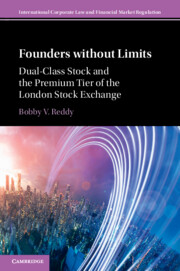Book contents
- Founders without Limits
- Cambridge University Press
- Founders without Limits
- Copyright page
- Contents
- Figures
- Tables
- Preface
- Acknowledgements
- Table of Cases
- Table of Legislation and Regulation
- Abbreviations
- Introduction
- Part I Putting Dual-Class Stock into Context
- Part II Evaluating Dual-Class Stock
- 5 From Controlling Shareholders to Dual-Class Stock
- 6 Theoretical Benefits and Detriments of Dual-Class Stock
- 7 The Empirical Evidence on Dual-Class Stock
- Part III Formulating a Policy on Dual-Class Stock
- Appendix Comparison of Inferior-Voting Shareholder Protections on Major Dual-Class Stock Exchanges
- Index
5 - From Controlling Shareholders to Dual-Class Stock
from Part II - Evaluating Dual-Class Stock
Published online by Cambridge University Press: 29 October 2021
- Founders without Limits
- Cambridge University Press
- Founders without Limits
- Copyright page
- Contents
- Figures
- Tables
- Preface
- Acknowledgements
- Table of Cases
- Table of Legislation and Regulation
- Abbreviations
- Introduction
- Part I Putting Dual-Class Stock into Context
- Part II Evaluating Dual-Class Stock
- 5 From Controlling Shareholders to Dual-Class Stock
- 6 Theoretical Benefits and Detriments of Dual-Class Stock
- 7 The Empirical Evidence on Dual-Class Stock
- Part III Formulating a Policy on Dual-Class Stock
- Appendix Comparison of Inferior-Voting Shareholder Protections on Major Dual-Class Stock Exchanges
- Index
Summary
The provenance of the FCA’s distrust of dual-class stock is the concern that a controller with control over the board of a listed company may use its unadulterated power to cause the company to act in a manner that creates ‘private benefits of control’ (or ‘controller benefits’ as labelled in this book) for the controller to the detriment of public shareholder value.That distrust is demonstrated by the plethora of regulations that notionally blunt the powers of controlling shareholders.However, one share, one vote controlling shareholder firms, such as Fraser Group and Antofagasta, are permitted on the premium tier, and the empirical evidence is inconclusive that they harm public shareholders.With one share, one vote, the controller necessarily has to own a significant portion of the equity to maintain control, constraining the financial incentives to extract controller benefits, and, as a tradeoff against public shareholder expropriation, incentivising monitoring which reduces managerial agency costs.The harsher treatment of dual-class stock stems from a diminishing equity-constraint, with the incentives to extract controller benefits increasing at an accelerating rate as the controller’s equity ownership declines.It is not, though, a fait accompli that controllers will, in fact, use dual-class stock in an invidious manner.
Keywords
- Type
- Chapter
- Information
- Founders without LimitsDual-Class Stock and the Premium Tier of the London Stock Exchange, pp. 165 - 187Publisher: Cambridge University PressPrint publication year: 2021



